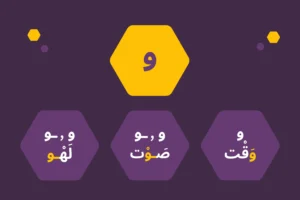
Learn the Arabic Alphabet: The Arabic Letter Waw و
Learn the Arabic Alphabet: The Arabic Letter Waw و. Master the arabic letter waw (و)! Discover how to pronounce “w”, its forms, and words in the arabic alphabet.
Touching down in the first Arabic-speaking country I had visited at the time, and realizing I had no language to communicate with the locals, was a sure-fire way to feel distant. Just a small introduction can lead to meaningful interactions, and I don’t know about you, but that’s what you remember from any trip. Even just a few phrases can make everyday interactions so much easier—from greeting someone to ordering food. So then, where to start?
This article will go over the ways in which you can use phrases to introduce yourself in Arabic, along with how to talk about your family, perhaps even discuss what you are studying or where you’re working. In addition, we will touch upon some dialect differences and some pronunciation tips to help you on your way! Don’t worry at all if it is a bit tricky at first, practicing consistently will help massively. Welcome to peruse other Alifbee blogs, especially this one that goes into more details about How You Can Say Hello.
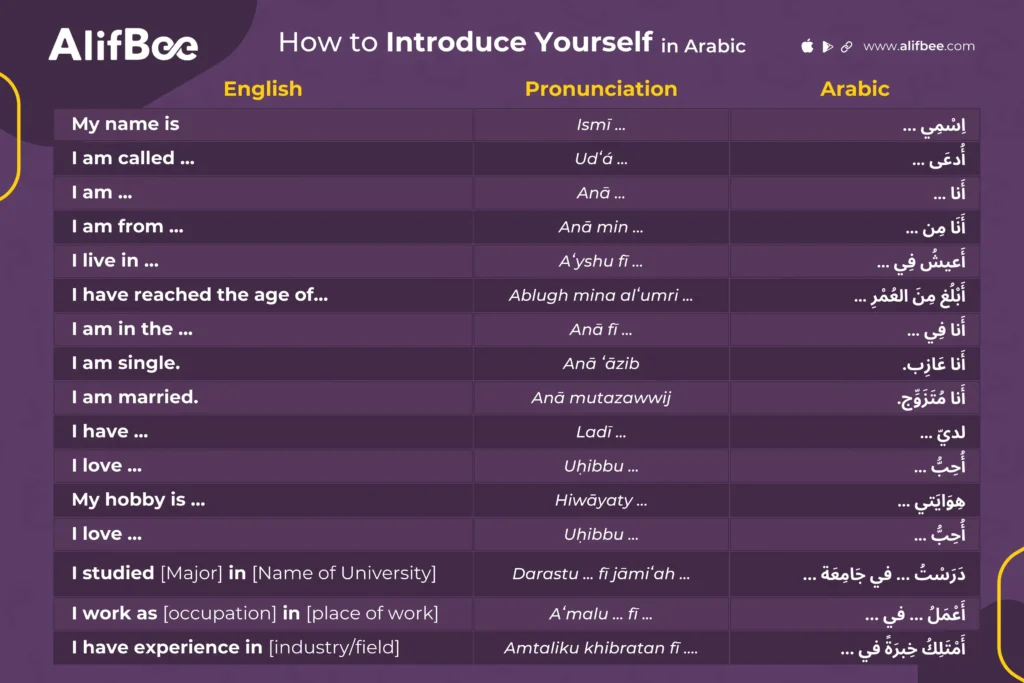
Let’s start with three ways in which you can introduce yourself in Arabic, and a point to note is that these self-introduction Arabic lines can be said by and to both male and female speakers, so one less thing to remember!
English Meaning
Pronunciation
Arabic
My name is …
Ismī …
اِسْمِي ...
My name is Muhammad.
Ismī muḥammad
اِسْمِي مُحَمَّد
The most common way of introducing yourself in Arabic is Ismī for ‘My name is…’. Just add your name after it, and there is no need to change the word for females.
English Meaning
Pronunciation
Arabic
I am called …
Udʻá …
أُدعَى …
I am called Layla.
Udʻá laylá
أُدعَى لَيلَى
You can also use Udʻá ‘I am called…’ for another easy way to introduce yourself in Arabic. It can be used for either a male or female speaker
The only difference here is that it is in the passive structure form. The first letter in the verb has damma, which is used to form passive verbs in Arabic.
English Meaning
Pronunciation
Arabic
I am ...
Anā …
أَنا …
I am Ahmad
Anā aḥmad
أَنا أَحمد
And for a third way to introduce yourself, you can simply say, ‘I am…’.
Now let’s see two Arabic lines you can use to talk about where you’re from.
English Meaning
Pronunciation
Arabic
I am from …
Anā min …
أَنَا مِن …
I am from Syria.
Anā min sūryā
أَنا مِن سُوريا
English Meaning
Pronunciation
Arabic
I live in ...
Aʻyshu fī …
أَعيشُ فِي ..
I live in Turkey
Aʻīshu fī turkyā
أَعِيشُ في تُركيا
These two phrases are very similar to each other, and also similar to the English equivalents.
And another important thing for self-introductions in Arabic is talking about your age.
Let’s look at two phrases that you can use to say how old you are.
English Meaning
Pronunciation
Arabic
I have reached the age of ...
Ablugh mina alʻumri ...
أَبْلُغ مِنَ العُمْرِ ...
I have reached the age of twenty-five years.
Ablughu mina alʻumri khamsatan wʻishrīna ʻāman.
أَبْلُغُ مِنَ العُمْرِ خَمسَةً وعِشرِينَ عَامًا.
This is a formal, classical way of stating age. This is close to Modern Standard Arabic, and you might see this expressed in an official capacity, potentially in certain literature and speeches.
English Meaning
Pronunciation
Arabic
I am in the ...
Anā fī …
أَنا فِي …
I am in the twenty-fifth [year].
Anā fī alkhāmisah wālʻishryna.
أَنَا فِي الخَامِسَة وَالعِشرينَ.
This phrase, unlike the last, is the casual day-to-day way of talking about your age among native speakers. But it is still suitable for formal uses since it is part of MSA.
To use a dialectic alternative, you can simple say عمري ʻUmry then your age. It is understood across almost Arabic dialects. So depending on the context, you might need to take a more formal or informal approach.
In Arabic, the simplest way to describe your social status is to use the singular pronoun Anā أنا + adjective (single, married, engaged etc.). Also, don’t forget that gender matters with these adjectives!
You can add ـة for feminine forms. Let’s see a couple of examples:
English Meaning
Pronunciation
Arabic
I am single.
Anā ʻāzib.
أَنا عَازِب
With this phrase, we need to use the right adjective for either male or female:
أعزب (ʾaʿzab) → single (m.)
عزباء (ʿazbāʾ) → single (f.)
Although this phrase is good to be aware of, a point to note is that it might be avoided to bluntly state, ‘I am single’, and perhaps a softer alternative could be:
لم أتزوّج بعد (lam atazawwaj baʿd) → “I haven’t married yet.”
English Meaning
Pronunciation
Arabic
I am married.
Anā mutazawwij
أَنا مُتَزَوِّج
The adjective used in this phrase is derived from the verb ‘to marry’ تزوّج (tazawwaja), directly meaning ‘one who has married’.
Here are some useful words to talk about other social states, all of which form the feminine adjective by adding the feminine suffix ـة (-a) to the end of the word:
English Meaning
Pronunciation
Arabic
married(M)
mutazawwij
متزوج
married(F)
mutazawwija
متزوجة
divorced(M)
muṭallaq
مطلق
divorced(F)
muṭallaqa
مطلقة
widow/widower(M)
ʾarmal
أرمل
widow/widower(F)
ʾarmala
أرملة
However, before the marital status questions, it’s more likely that you are asked the more general family questions. You can use ‘I have…’ to answer familial inquiries.
English Meaning
Pronunciation
Arabic
I have …
Ladī …
لديّ …
I have a boy, a girl, one brother, and two sisters.
Ladayya ṭiflun wṭiflah wʼakhun wāḥidun wʼukhtān.
لَدَيَّ طِفلٌ وطِفْلَة وأَخٌ وَاحِدٌ وأُختَان.
This phrase can be used when discussing family or to answer questions like:
هل لديك أولاد؟ (hal ladayka ʾawlād?) → “Do you have children?” (formal).
This is, as stated, the formal way, Levantine Arabic is a bit more casual, for example:
(ʿandak wlād?) “Do you have kids?” عندك ولاد؟
These are perfect phrases to ask and answer with new acquintances!
English Meaning
Pronunciation
Arabic
I love …
Uḥibbu …
أُحِبُّ …
I love football
Uḥibbu kurata alqadami.
أُحِبُّ كُرَةَ القَدَمِ.
Just like in English, you can follow this structure with a noun like ‘music’ or a verb in the -ing that acts as a noun, for example, ‘I love reading’ (أُحِبُّ القراءة).
When it comes to formality, it is pretty neutral in tone and can work for the more formal MSA and also casual conversations. Also, it is perfectly okay to express ‘I love’ for things that you like in Arabic, the stronger emotions are common.
English Meaning
Pronunciation
Arabic
My hobby is…
Hiwāyaty …
هِوَايَتي …
My hobby is reading.
Hiwāyaty alqirāʼah.
هِوَايَتي القِراءَة.
The root form of the verb هِواية (hiwāya) = “hobby,” along with that possessive suffix -ي (-y) = “my” make this structure. Just like ‘I love…,’ this can be followed by a noun or verbal noun, هِوايتي الرسم (My hobby is drawing).
In everyday language, the simple Levantine structure is often preferred, بحب الرسم (baḥibb ar-rasm – I like drawing, Levantine), however the formal structure of ‘My hobby is…’ is used more in schools and CV’s.
English Meaning
Pronunciation
Arabic
I studied…in...
Darastu ... fī jāmiʻah ...
دَرَسْتُ ... في جَامِعَة ...
I studied Business Administration in Damascus University.
Darastu idārata alʼaʻmāli fī jāmiʻati dimashq.
دَرَسْتُ إِدَارَةَ الأَعمَالِ في جَامِعَةِ دِمَشْق.
As you might assume, this is more of a formal structure, often used in Modern Standard Arabic and not heard in everyday dialects. You can use it in writing, emails or Cvs, and in speaking too, when introducing yourself to colleagues and peers in conferences and networking events.
English Meaning
Pronunciation
Arabic
I work as…in…
Aʻmalu ... fī ...
أَعْمَلُ ... في ...
I work as a manager in a marketing company.
Aʻmalu mudīran lisharikati taswīq.
أَعمَلُ مُدِيرًا لِشَرِكَةِ تَسْوِيق.
Use this simple structure to talk about your position and where you work. It’s common stating both in one sentence. People in Arabic countries don’t necessarily give the name of the company, unless it’s popular. But they take pride in mentioning the industry they are in.
Another thing to note is that certain titles carry a level of prestige, like being a doctor (دكتور) or an engineer (مهندس). People take great pride in using them as titles as well.
English Meaning
Pronunciation
Arabic
I have experience in …
Amtaliku khibratan fī …
أَمْتَلِكُ خِبرَةً في ..
I have experience in managing companies.
Aamtaliku khibratan fī idārati alshsharikāt.
اَمتَلِكُ خِبرَةً في إِدَارَةِ الشَّرِكَات
Ending on a formal note, it would be appropriate to use this expression in a job interview. Well there we go, you made it to the end of the 15 phrases! It’s one thing reading this article, but read on to find some ways of helping the language to cement.
There are a lot of phrases to choose from here today, but how to make them stick? I find writing them down with personal examples really helps to make it more pertinent and memorable. If you have an Arabic speaking partner you can use them in daily conversations, and if someone is able to use these phrases back to you that can be a good way to solidify the core part of the phrase.
When it comes to the right Arabic dialect, you can focus on the one that matches your goals. It is definitely useful to be confident with Modern Standard Arabic (MSA) first. It will provide a great foundation. Then you can learn Egyptian or Levantine Arabic for example.
We had some useful phrases to help you introduce yourself in Arabic and they you can use in both formal and informal settings, and of course it’s up to you which of the Arabic dialects you want to focus on along with the MSA forms.
Why not write these down tonight, and start the learning process today! Think of what you would say with some personal details, and get practicing.
If you want to supplement your learning, download the AlifBee app and have a look at some more blogs on our website, and happy practicing!
Author
Dania is a teacher, translator, and content writer with a passion for making Arabic accessible and enjoyable for learners around the world. As the Blog Manager at AlifBee, she writes educational blogs that blend language tips, cultural insights, and practical learning strategies to support every Arabic learner’s journey.

Achieve incredible results with our platform Learn Arabic Online with AlifBee

Join AlifBee Virtual School and master Arabic at your pace — from guided coaching to interactive self-learning.

Learn Arabic faster with live, one-on-one sessions tailored to your level and goals.

Explore AlifBee’s complete range of Arabic learning books for all ages!

Learn the Arabic Alphabet: The Arabic Letter Waw و. Master the arabic letter waw (و)! Discover how to pronounce “w”, its forms, and words in the arabic alphabet.
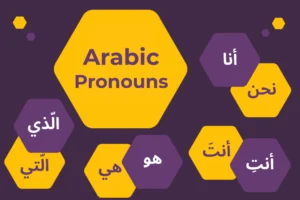
Learn all Arabic pronouns in one clear guide. Personal, demonstrative, relative & possessive pronouns explained with examples for learners.
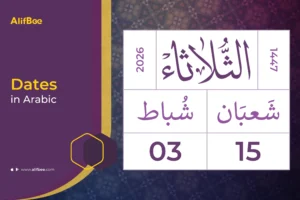
Learn how to write, read, and pronounce dates in Arabic. Clear rules, real examples, and common mistakes explained for learners.
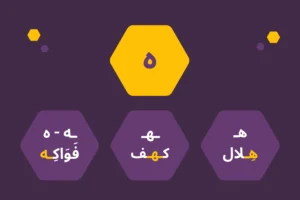
Master the Arabic letter Haa (ه)! Explore its form, pronunciation, and variations. Learn how to write and pronounce the haa arabic letter with examples.